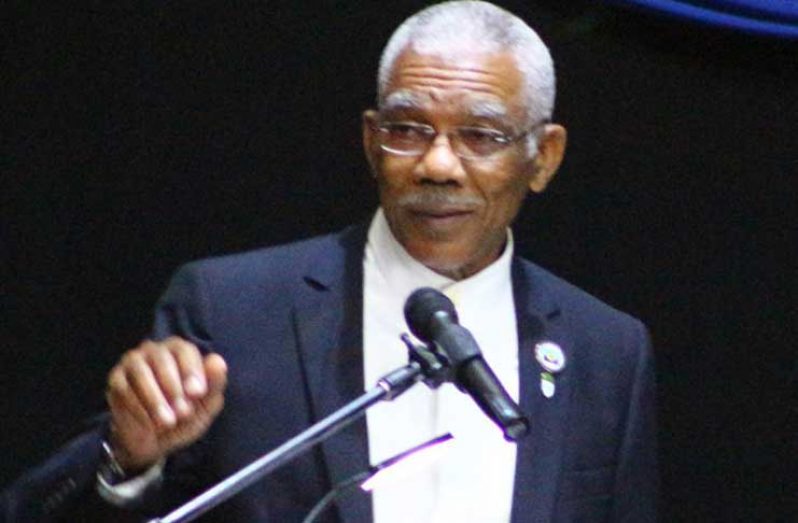PRESIDENT David Granger has assented to the Tobacco Control Bill 2017, but it will take another nine to 12 months before the Act takes effect, banning smoking in public spaces and the sale of single cigarettes among other measures aimed at safeguarding non-smokers from the harmful effects of tobacco.
On August 22, 2017, President Granger assented to the Tobacco Control Bill which was passed in the National Assembly on July 27, 2017. The Tobacco Control Act provides for the adoption and implementation of tobacco-control policies in accordance with the World Health Organisation’s (WHO) Framework Convention on Tobacco Control (FCTC).
Additionally, it will serve as the legal regulator for administration, inspection and enforcement, while providing legislative protection from exposure to second- hand smoke by eliminating public-smoking.
Head of the Public Health Ministry’s Public Relations and Health Promotion Unit, Terrence Esseboom, when contacted on Friday told the Guyana Chronicle that the Tobacco Control Act will not be implemented immediately, allowing for nine to 12 months of public awareness. He explained that cigarette vendors will be educated on key elements of the bill, in addition to officials from the Ministry of Education, Culture, Youth and Sport, restaurant and hotel owners, and owners of other public entities. It was noted that the Tobacco Control Campaign, which will commence soon, forms part of a wider programme tackling key issues surrounding Non-Communicable Diseases, Maternal and Child Health and Tobacco Cessation.
Section 16, Part V of the Tobacco Control Act – Protection from Exposure to Second-Hand Smoke – allows for the banning of smoking in indoor workplaces and public transportation.
Additionally, Section 16, Sub-section 2, states that persons shall not smoke in outdoor places that are within five metres from a window, doorway or any indoor public place or indoor workplace. Smoking is also prohibited on the premises of and within five metres from the outside boundaries of any health care, educational or childcare facility. Notably, when it takes effect, the Act will ban smoking in public places including, but not limited to, any public transport stop, bus stand or bus park, any park, playground or amusement park, any stadium, arena or other kind of sport or performance space. Persons will also be banned from smoking in restaurants and bar or any area where food and drinks are being sold. “Any person who smokes in any place where smoking is prohibited commits an offence and is liable on summary conviction to a fine of $10, 000 for the first offence, and $20, 000 for any second or subsequent offence,” Sub-section 3 states.
Meanwhile, Part VI of the Act addresses the issues of advertising, promotion and sponsorship. According to Section 19, “All advertising, promotion and sponsorship of tobacco products and electronic delivery systems are prohibited.”
It was stated that the prohibition includes any tobacco advertising, promotion and sponsorship that promote or are likely to promote the tobacco industry, directly or indirectly.
PAHO/WHO National Consultant, Attorney-at-Law Kesaundra Alves had explained that the comprehensive ban of all tobacco advertising promotions and sponsorship is in keeping with Article 13 of the FCTC, noting that it was critical to block all loopholes the local tobacco industry may want to use to its advantage.
“The tobacco epidemic is one that is not spread by infection but by promotion and advertisement. Tobacco Advertising, Promotion and Sponsorship (TAPS) glamorises tobacco use by associating the use of tobacco products with positive social and personal images,” Alves posited.
According to her, stamping out all forms of TAPS is the only way to eliminate the tobacco epidemic.
Part VIII of the Act not only bans the sale of tobacco products to minors, but also the sale of single cigarettes no less than 20 cigarettes per pack and 20g of smokeless tobacco products per pack. “Single stick sales make it easier for children to buy tobacco products; and also prevents consumers’ access to health warnings,” Alves explained.
Public Health Minister Volda Lawrence, in defending the Tobacco Control Bill in the National Assembly, had pointed out that the tobacco epidemic remains one of the greatest public health threats of the 21st century claiming the lives of 7 million people annually. Six million of those deaths are a direct result of tobacco consumption, while about 900,000 are the result of non-smokers being exposed to second-hand smoke.
Minister Lawrence said what manufacturers do not disclose is the fact that there are more than 4000 chemicals in tobacco smoke, of which 250 are known to be harmful and more than 50 are known to cause cancer.
“There is no safe level of exposure to second-hand tobacco smoke,” she declared.
Tobacco consumption and exposure to tobacco smoke are not only a leading cause of death, disease and disability, but also of impoverishment, the Public Health Minister told the House, while arguing that tobacco users who become sick, disabled or die prematurely deprive their families of income, deplete the country of its labour force, and increase the cost of public health care, hindering general economic development.




.png)









